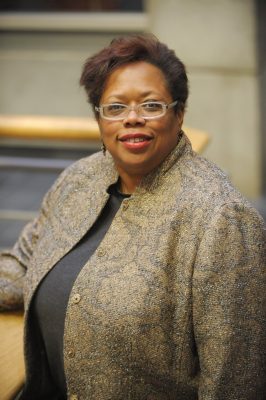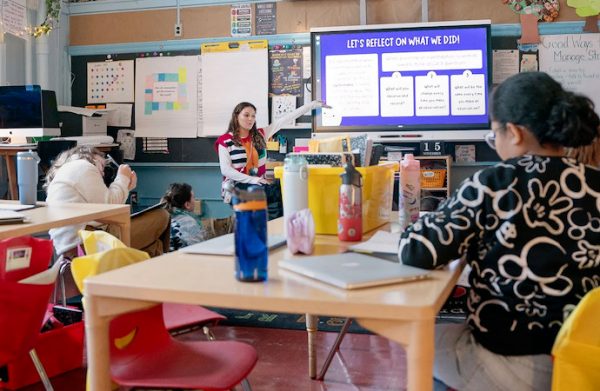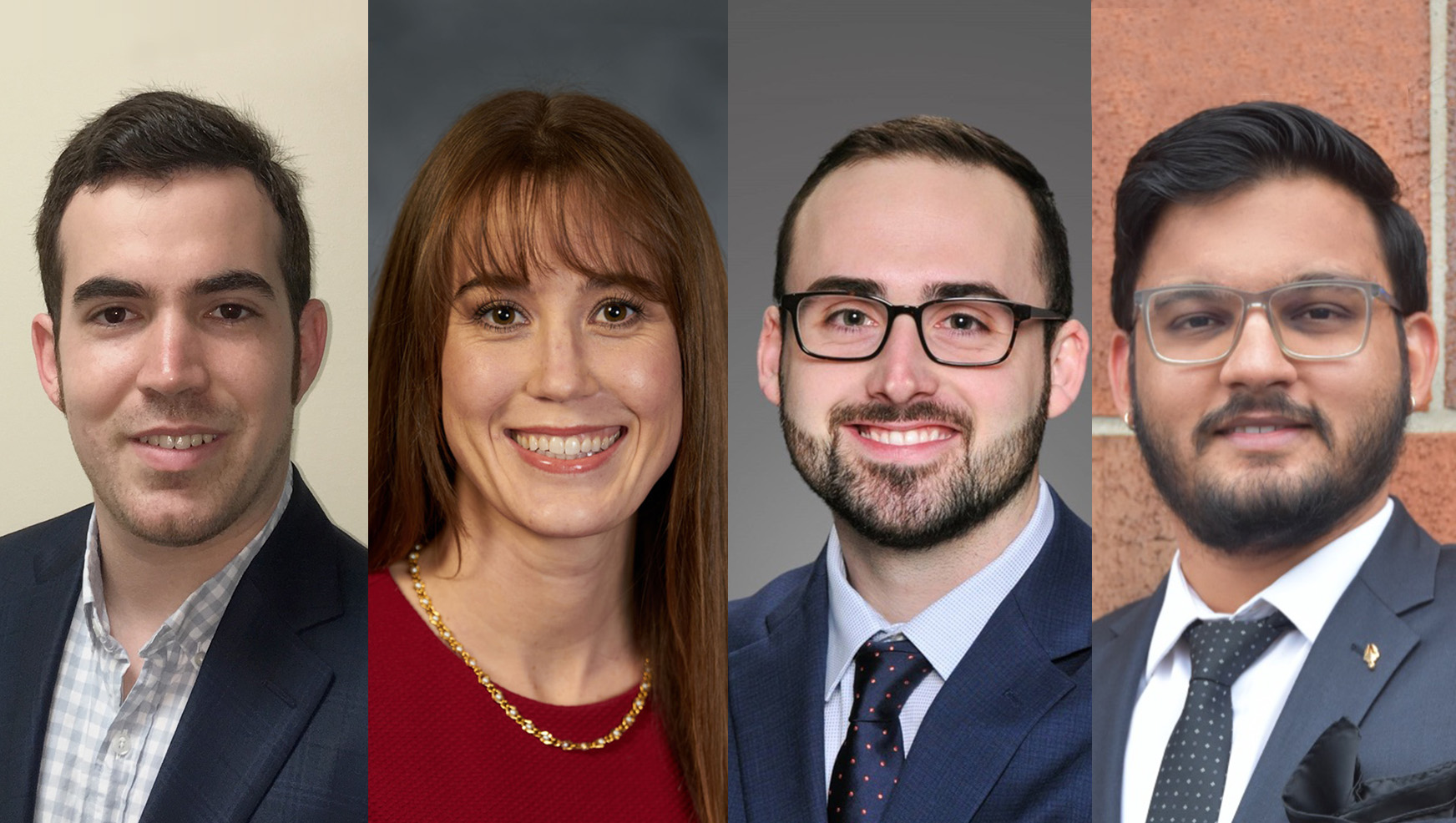Yulia Bychkovska was in Boston in February 2022 when Russian missile attacks struck a mostly residential area west of her home in Zhytomyr, Ukraine. Though she was in the U.S., she learned of the invasion before her mother. “I...
Yulia Bychkovska was in Boston in February 2022 when Russian missile attacks struck a mostly residential area west of her home in Zhytomyr, Ukraine. Though she was in the U.S., she learned of the invasion before her mother.
“I had to call my mom and wake her up to tell her the war had started,” said Bychkovska, who had recently completed a bachelor’s degree at Columbia College in Missouri. “I was very worried because I didn’t know what was happening on the ground. All I knew was this terrible news.”
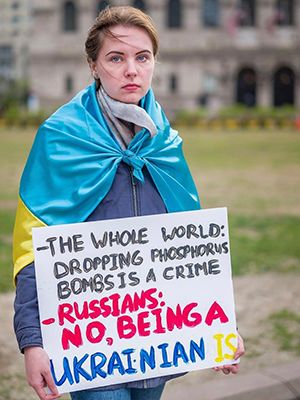
Yulia Bychkovska is shown at a Boston rally that followed Russia’s full-scale invasion of her home country, Ukraine, in February 2022.
In the days that followed, she would call family just before she went to bed to check on them, and then do the same as soon as she woke up. “I didn’t know if I would see them again,” she said.
Around the same time, Bychkovska learned she had been accepted to the Maxwell School of Citizenship and Public Affairs to pursue dual master’s degrees in public administration and international relations. It was a dream realized, but she knew she couldn’t begin her studies that July unless she returned to Ukraine to see her loved ones.
Without telling them, she boarded a plane for Poland and then embarked on a 16-hour bus ride home. The arduous route took her past the remains of shelled buildings and other signs of war. Though it was painful to see the destruction, she was relieved to be home. “I wanted them to know I didn’t abandon them,” she said of her family. “Also, in some ways it gave me peace of mind because I knew what my parents were doing, how society acted in war, and that they had some protections in place like the warning sirens.”
Bychkovska’s mother made her promise she would cut her visit short and return to the U.S. if their city was attacked. The day dozens of bombs exploded nearby, Bychkovska’s mother said, “It’s time to go.” She packed her bags and quickly returned to the U.S.
Soon after, Bychkovska began her Maxwell studies.
Nearly two years into the invasion in Ukraine, she and other students from the embattled country carry what few of their classmates can comprehend—worry for their loved ones back home, and sometimes, feelings of guilt for having been afforded such opportunity.
But they find refuge joining a community of scholars with a long history of supporting those impacted by war and the unique opportunities to collaborate, research and influence policy in support of Ukraine’s sovereignty.
Veterans Bridge
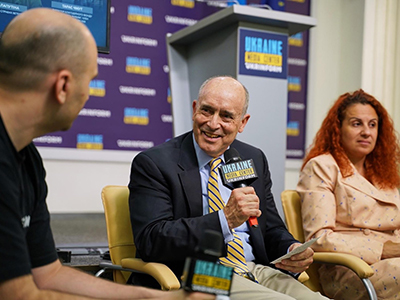
The Hon. James E. Baker is shown during an appearance on a Ukrainian news station during a visit last summer to the embattled country. During the interview, he advocated for the care of the growing population of Ukrainian veterans to bolster national security. Seated on the right is Nataliia Kalmykova, one of Ukraine’s deputy ministers of defense.
The US-Ukraine Veterans Bridge brings experts from the U.S. veterans’ community together with officials in Ukraine to support its bourgeoning veteran population and build national security. The leading academic partners in the relatively new coalition are two Maxwell professors, the Hon. James E. Baker and Vice Admiral Robert B. Murrett (U.S. Navy, retired).
Baker, a highly regarded national security lawyer, policy advisor and former chief judge of the U.S. Court of Appeals for the Armed Forces, and Murrett, a principal investigator of the Intelligence Community Center for Academic Excellence, are aligning resources from Syracuse University and offering their expertise. The coalition works with the Ukraine Veterans Foundation (UVF), and it includes veterans from the U.S. and Ukraine and leaders in areas such as health care, benefits administration, education, employment, reintegration and family.
The professors, who serve as the director and deputy director of the Syracuse University Institute for Security Policy and Law, invited Bychkovska and fellow Ukrainian student Eduard Gusak to participate in meetings where they get to witness and take part in international collaborations to build their country’s national security.
“The students bring important perspective to our work in support of Ukrainian security, both in terms of direct contact with counterparts in Kyiv and in assisting Maxwell students in relevant research and programs dealing with the effects of the Russian invasion,” said Murrett, professor of practice of public administration and international affairs. “For example, both Yulia and Eduard have a role in a current master of public administration workshop, a semester-long student research effort which evaluates comparative veterans’ support programs and is sponsored by the UVF.”
Veterans Bridge meeting participants sometimes include Nataliia Kalmykova, a Fulbright scholar who became executive director of the UVF weeks before the Russian invasion. Now one of Ukraine’s deputy ministers of defense, she visited Syracuse University last spring and met with Baker, Murrett, Maxwell Dean David M. Van Slyke, Ukrainian students and numerous other University representatives, including from the D’Aniello Institute for Veterans and Military Families.
The students have gained experience in international collaboration and crisis response as well as a deeper understanding of the relationship between the care and treatment of veterans and national security.
“A society of demobilized veterans can be a force for good, as the World War II G.I. Bill boom demonstrated in the United States,” Baker explained in a position paper he recently shared with the U.S. government and Ukraine’s Ministry of Veterans Affairs. “It can also result in instability if those veterans are alienated from society or government and subsequently mobilized as a political movement or military force,” he wrote.
‘A way of paying it forward’
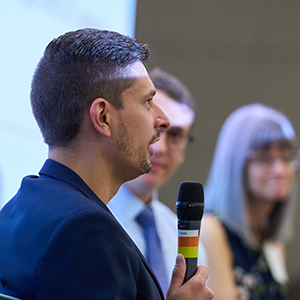
Mark Temnycky G’17 joined an alumni panel, “What is a public service perspective?” during a colloquium for incoming master of public administration students this past July. From Ukraine, he shared how he advocates for his home country in his work as a nonresident fellow at the Atlantic Council’s Eurasia Center and as a freelance journalist.
Last July, Eduard Gusak and other incoming M.P.A. students began their year-long academic journey with a two-day colloquium that serves as an in-depth orientation and networking opportunity.
One of the colloquium events, “What is a public service perspective?” included a Ukrainian-American, Mark Temnycky G’17.
Temnycky, who is a defense contractor, a nonresident fellow at the Atlantic Council’s Eurasia Center and a freelance journalist, writes about the war for major outlets like The New York Times and recently received the Ukrainian World Congress’ inaugural “Ukrainian diaspora 30 under 30” award. He was also recognized by the International Sports Press Association for his coverage of the Russian invasion. He shared some of the pivotal opportunities he took advantage of while studying at Maxwell, including an internship with NATO and work for the Ukraine Parliament. “I always had this desire for public service,” he said.
Of his writing, he added, “It is a way of paying it forward and informing people what’s happening.”
Gusak was inspired by Temnycky and fellow panelists. He appreciates the opportunities he has been afforded, for instance joining the US-Ukraine Veterans Bridge meetings and working as a research assistant to Murrett.
Murrett and other faculty often ask him to consider how he might apply what he learned back home. “For now, I have experienced the hardest period in my life, but on the other hand, I am being provided opportunities to learn from people with an enormous amount of life experience and a willingness to help,” said Gusak. “The reason why I came here is because of the opportunity to gain this experience to influence Ukraine’s future.”
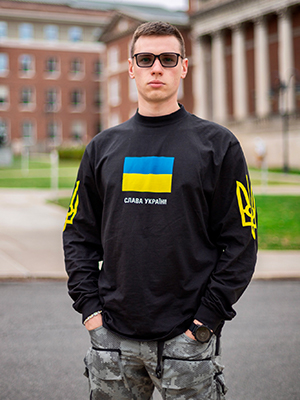
In the U.S. for two years through a program called “Uniting for Ukraine,” Eduard Gusak is pursuing a master of public administration at Maxwell and hopes to return to Ukraine to help it gain independence from Russia and rebuild from the war.
Gusak was home in Kyiv when Russia invaded. Shortly after, his parents asked him to bring his older sister to Slovakia, where she would be safer. While there, he received a call from Gennady Bratslavsky, a family friend who is chair of the urology department at Upstate University Hospital in Syracuse.
Gusak told Bratslavsky he considered returning to Ukraine, but as a young man he knew he would return to a higher level of responsibility while his country was at war. He didn’t expect he would be called to service in the military; a supporting role in government seemed more likely given his background—he’d received a bachelor’s degree in political science and government from Taras Shevchenko National University of Kyiv.
Bratslavsky told Gusak about a new program that enables Ukrainians to come to the U.S. with the support of a sponsor. He mentioned opportunities at Syracuse University and the Ukraine 1991 Foundation, a nonprofit he co-founded that provides humanitarian aid to the frontlines.
In August 2022, Gusak relocated to Syracuse to stay with the Bratlavskys. He enrolled at the English Language Institute in the College of Professional Studies to improve his fluency, and applied to Maxwell.
When he learned he’d been accepted, he said he “almost jumped to the sky” from excitement.
The Maxwell School is a community of faculty who research the rule of law, international politics, and peace and security, and are helping build networks of scholarship and training to support democracy in Ukraine. To read the full story, visit the Maxwell website.





